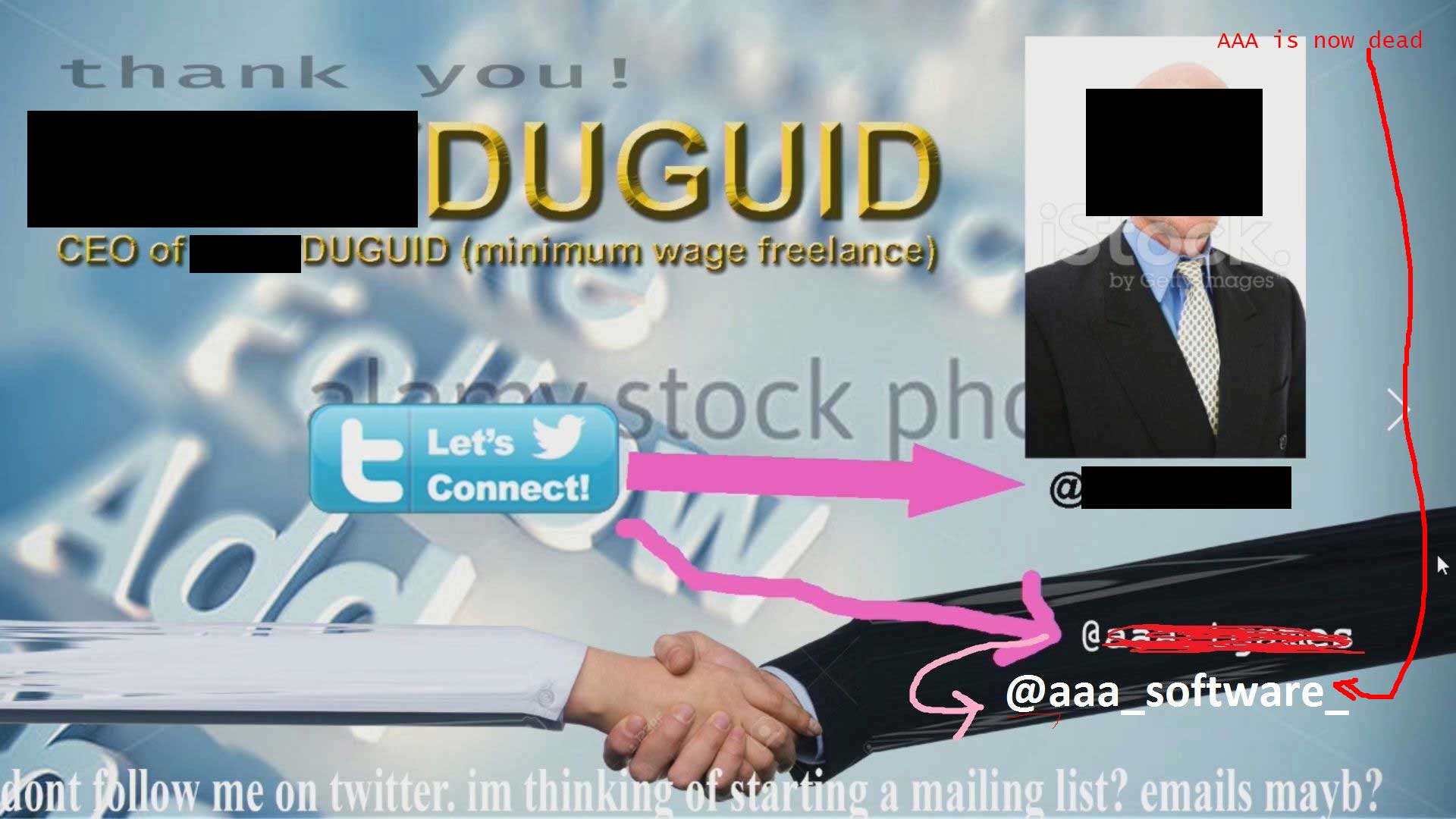The following is a mirror of a blog post of a transcript of a talk i gave in Milan for AAA's series Acid Games. Hopefully the AAA website stays up for the long term, but i thought it would also make a fitting first post for my blog.
Now in the middle of corona hell I cannot help but be nostalgic of those days. The world seemed full of possibilities for AAA. We were a rag-tag group of misfits who had just released a game we were all really pleased with, and people were starting to pay attention. Unfortunetly it was soon later we began the cursed project Utopias that would prove to be our downfall.
I hope one day to regain the passion I had then. I feel like I've spent the years since in some kind of uninspired depression haze. Where does time go... Enjoy the post.
Hello, this is my talk, it’s called: UNLEARNING, Or, How I Learned To Stop Worrying And Love The Hive Mind.
Intro
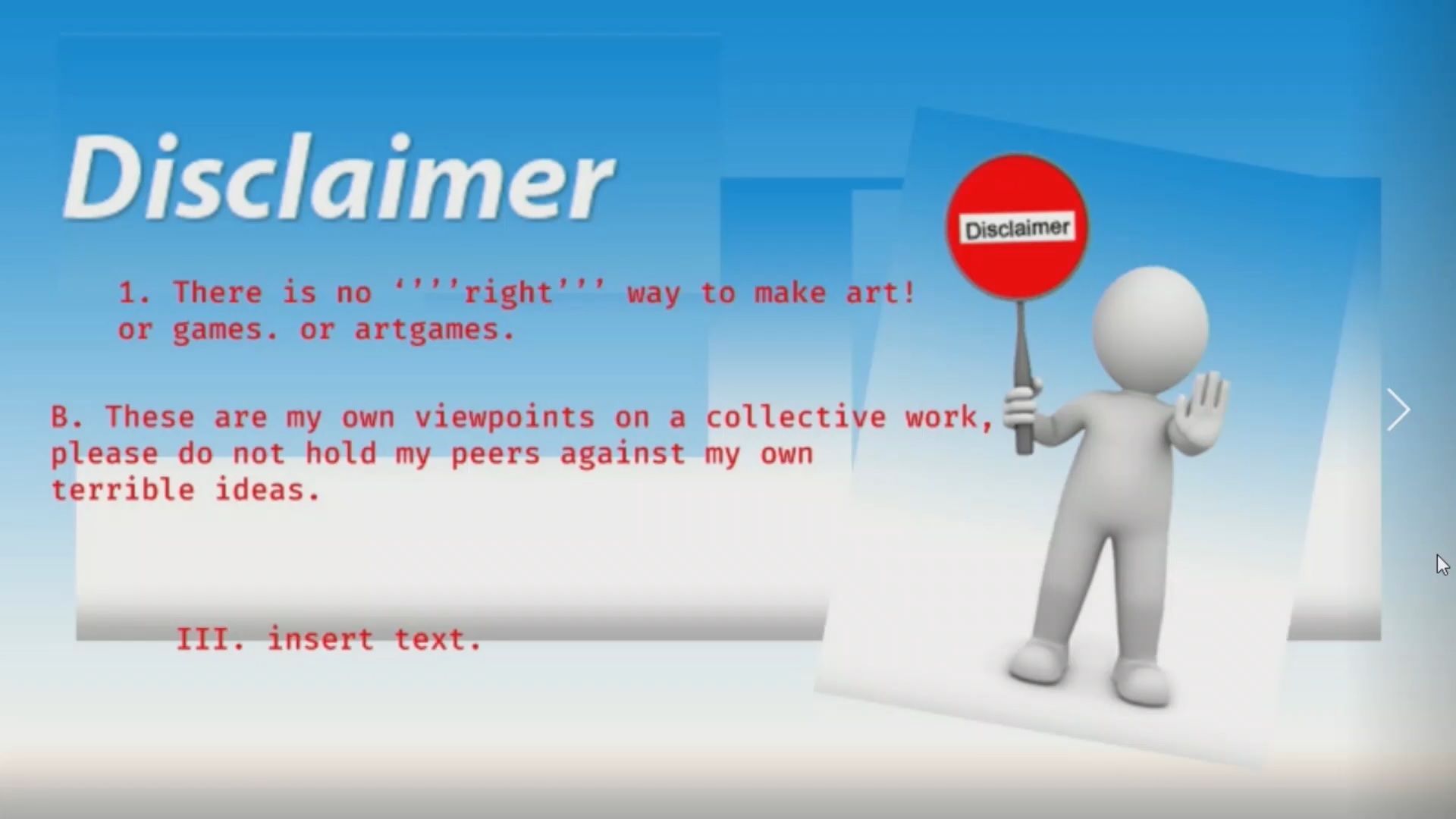
!Disclaimer! There’s no right way to make art, or games, or ąяţǥąʍ€$. These are my own viewpoints on collective work, so please don't hold my collaborators against my own terrible ideas. And three -
I - Collaboration
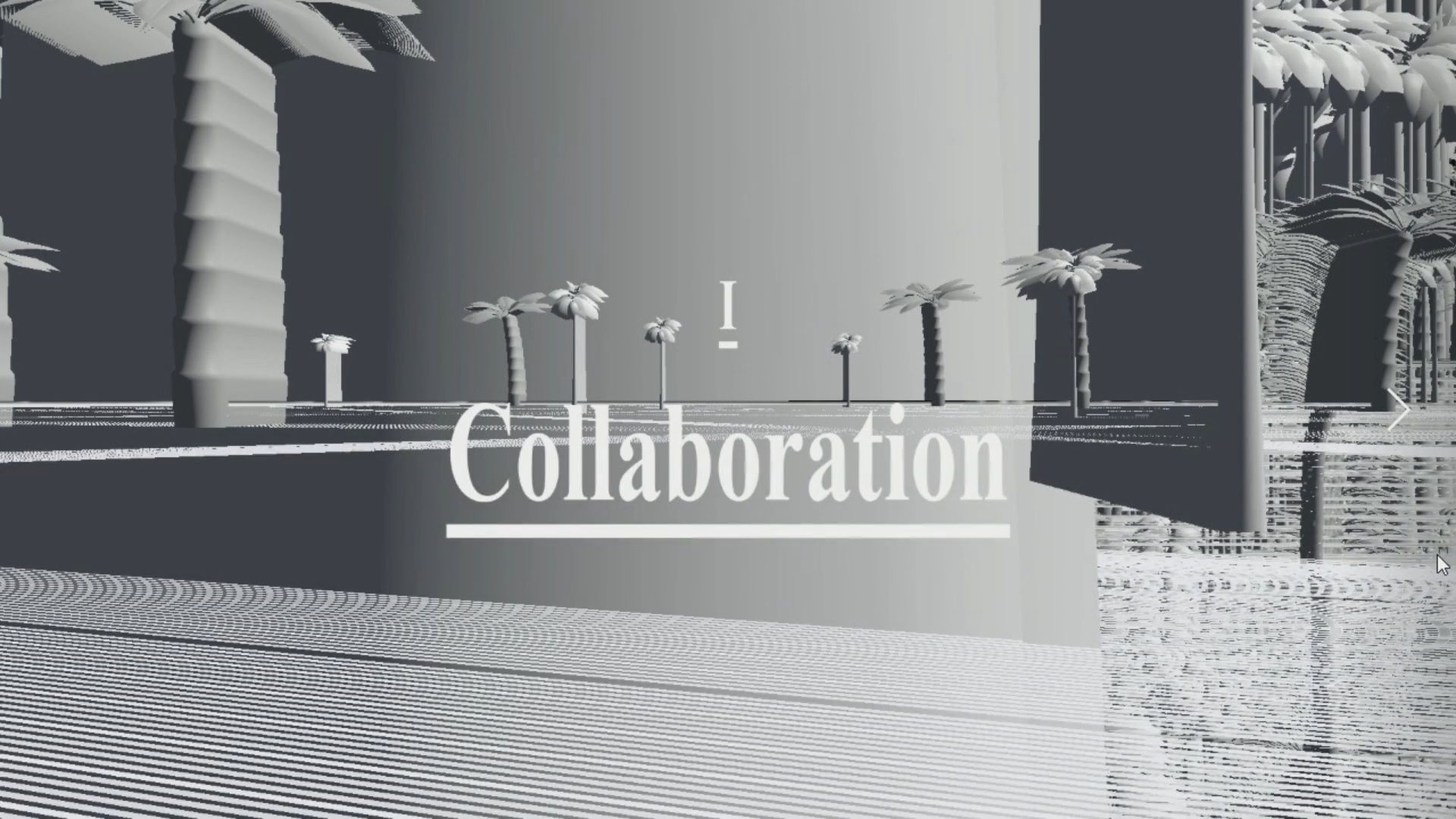
All so called games start with an idea.
Brilliant ideas like:
What if I could kill a lot of people?
or
What if I could kill A LOT of people?
or
What if I could kill A LOT of people in VR?
But before we talk about ideas, we need to talk about how these ideas are EXPRESSED!
THE PYRAMID OF VIDEOGAMES
FLOOR 2: THE EXPOSED AAA FRUSTUM OF SURFACE EXPRESSION
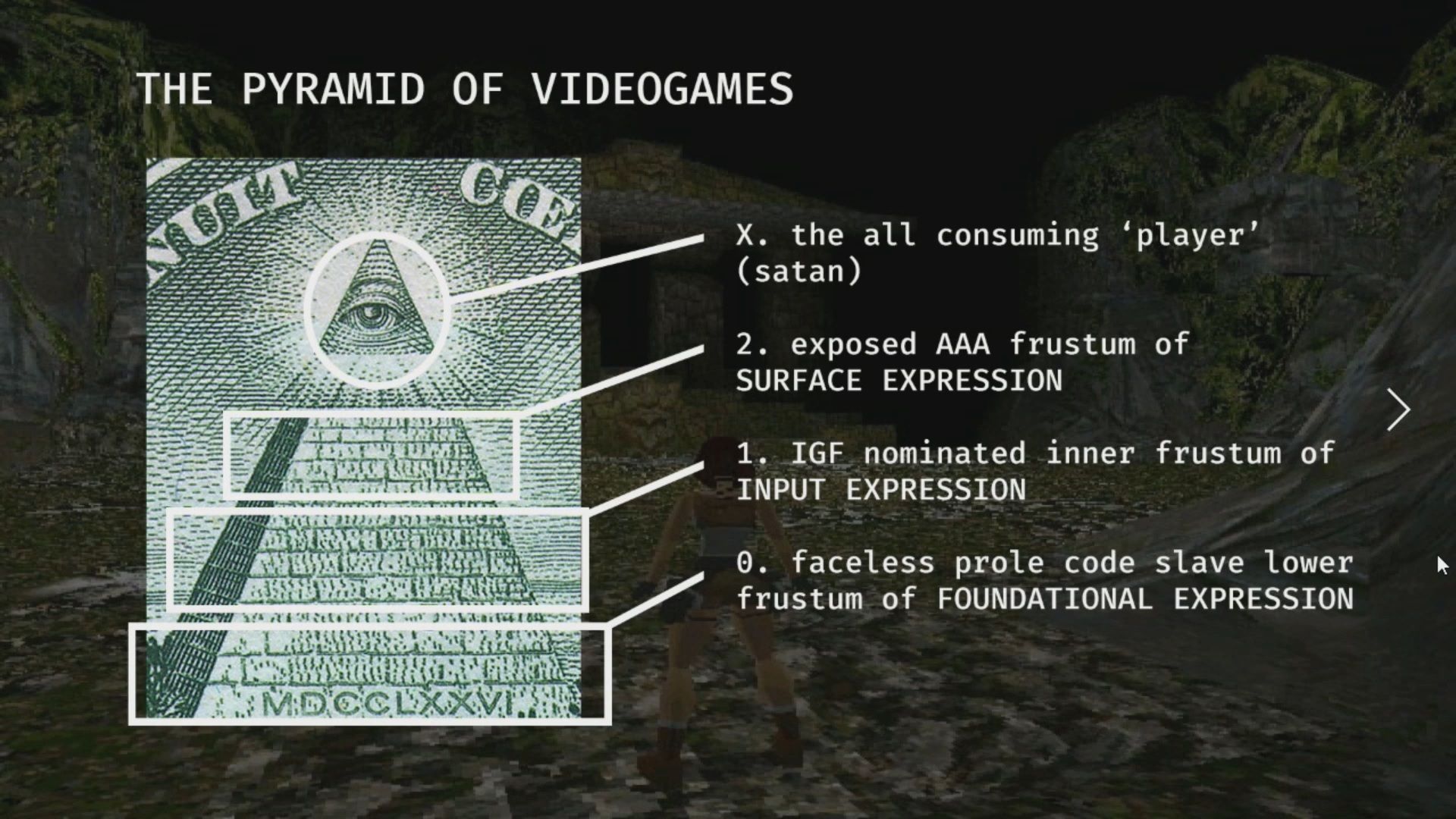
This is kinda like a self help graphic I’ve created: I created this artwork, it’s called The Pyramid of Videogames.
The top is a very complicated subject we’re not going to get into.
The second is, “the exposed AAA frustum of SURFACE EXPRESSION”. And by “AAA”, I don’t mean us, I mean the actual AAA, that we all know, the mainstream AAA. So this expression exists outside of the behaviour patterns of the game. You have a theme, and then you have your game designers, your dev team, and the art team, and they’re kinda getting these abstract concepts and kind of applying an idea to them. This is like, if you get a big rectangle, and you know it does 10 points of damage, and so you turn it into an axe, or something like that, because your game is a Skyrim game.
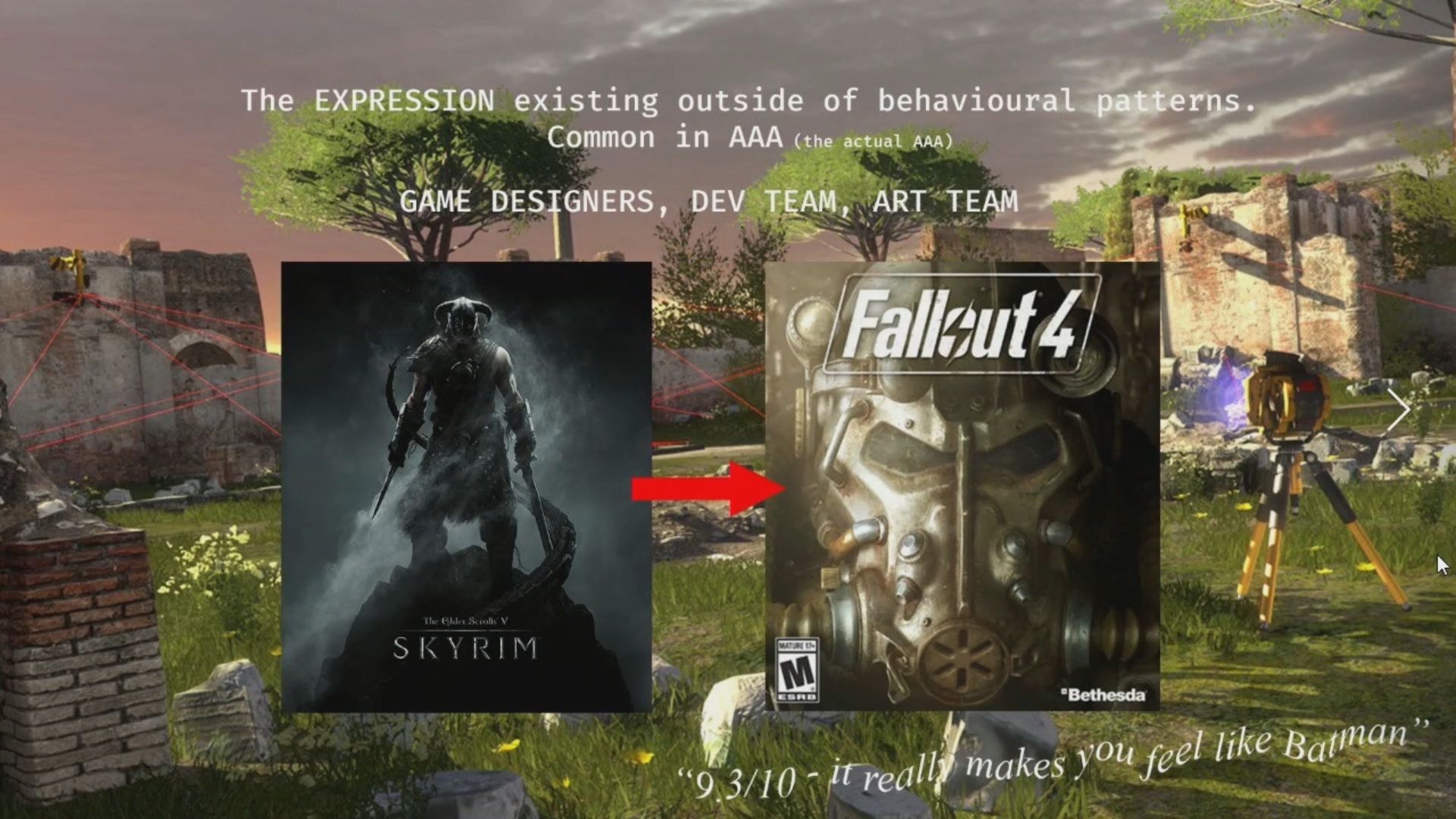
So this is kinda how Skyrim and Fallout 4 are essentially the same game, and you’re kinda just changing the setting, and the mechanics and the theme are kind of separated. Another one is the Talos Principle (Has anyone played that?), where it’s like quotes from the bible while you push boxes around - I don’t really understand what that games about. Gameplay, story, and gameplay, story, rinse repeat, kind of creates this cognitive dissonance: like press “F” to pay respects.
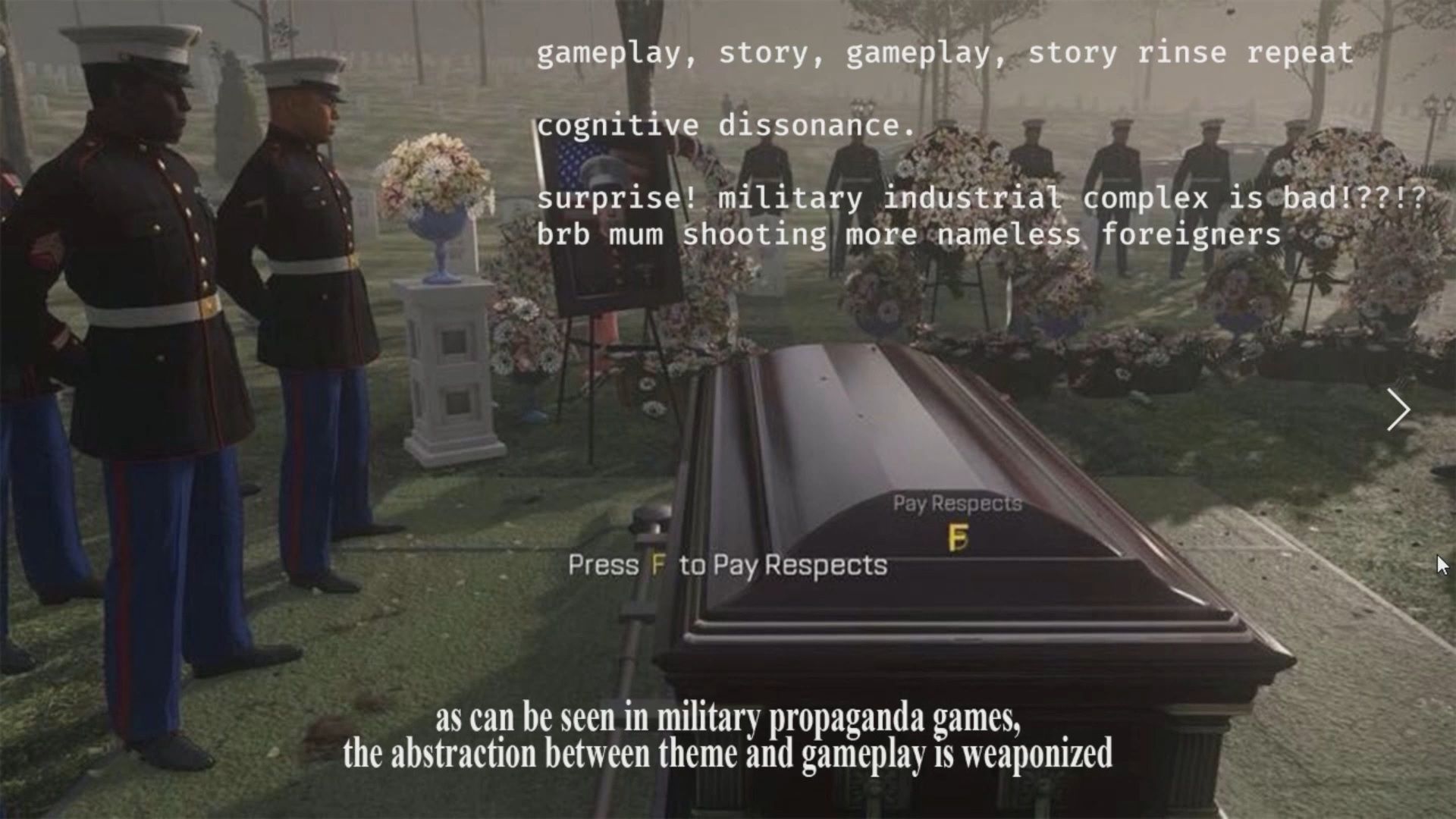
It can also be weaponized, cos you’re kind of associating something enjoyable with something that is not actually related. Like how Call of Duty games are made to be fun, but they are also made to recruit people to the military. There’s no relationship between those two things, but you think there is when you play it. I couldn’t have put it better myself: in game design, “environmental storytelling” is the art of placing skulls near a toilet - [ben esposito 5:16AM - 15 March, 2016].
FLOOR 1: THE IGF NOMINATED INNER FRUSTUM OF INPUT EXPRESSION
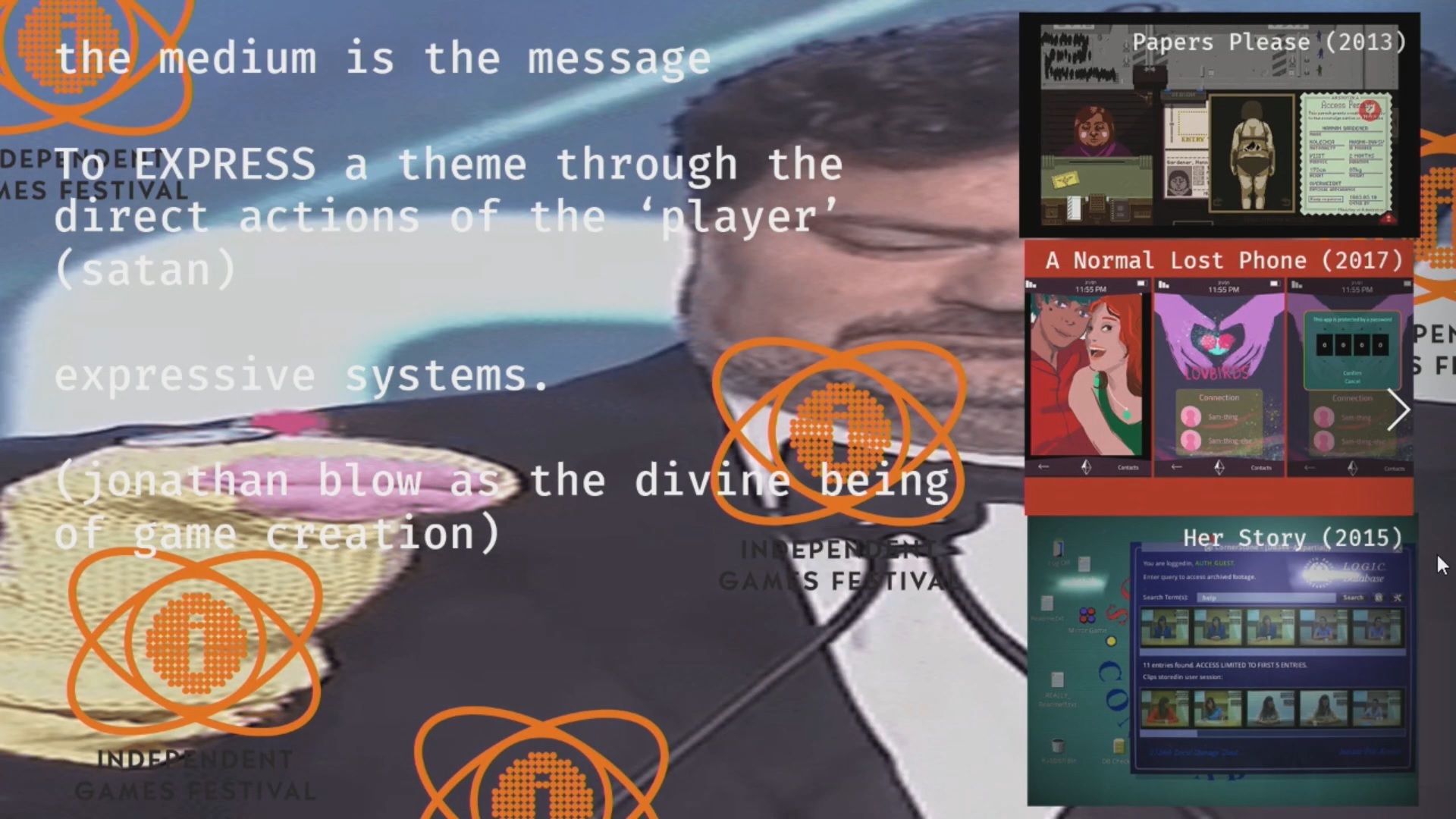
So that’s level one, and now we’re going down a ground, this is the “IGF nominated innerfrustrum of INPUT EXPRESSION”. This is like what indie games does. Indie games love this. This is when you create a systemic thing that is expressing your idea. I think probably the best example is “Papers Please” - this is like a holy grail to many people, I think it’s a fantastic game, in fact this view is totally legit - to express the theme through the direct actions of the player. The medium is the message.
FLOOR 0: FACELESS PROLE CODE SLAVE LOWER FRUSTUM OF FOUNDATIONAL EXPRESSION
But then, there is a level below that, ground zero, the “faceless prole code slave lower frustum of FOUNDATIONAL EXPRESSION”. So, what does that mean? Well, as an example, I worked on this game called “Data Mutations” with Chloê, Gabriel, Jack, Jessica, Matias, Merle, Mike, Tristan, Nomi, Yulia, Troy and Fedya - and it involved collective asset creation. This is an alternative to industrial power hierarchies that most games are made.
This is what the game looks like, I guess some of you are already familiar with it. It doesn’t look like a typical game.
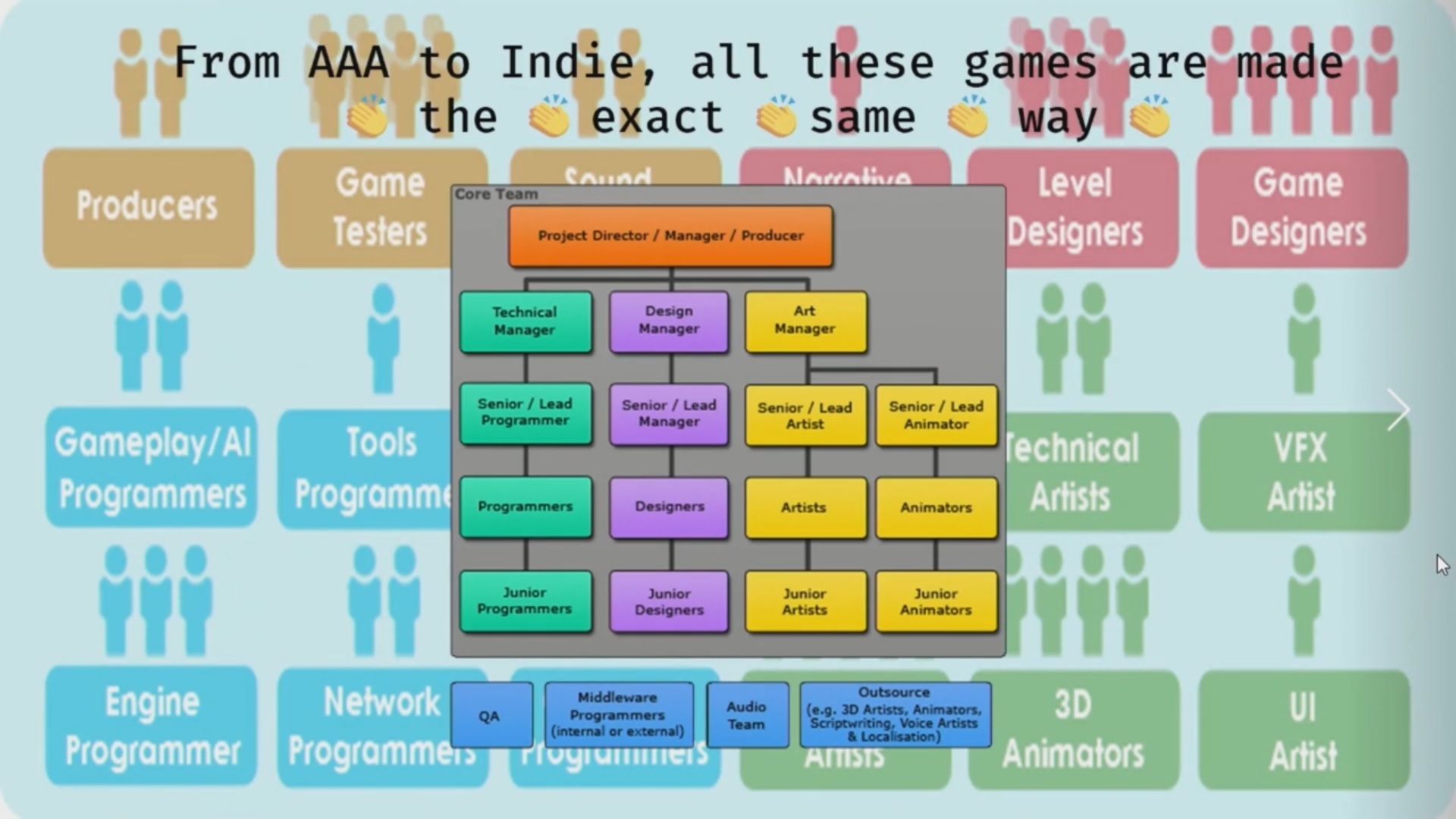
From indie to AAA, all these games are made 👏 the 👏 exact 👏 same 👏 way. You have a hierarchy that’s formed of leads, and there’s leads above that, and so on. The responsibility is going downward, and people at the bottom are paid less, the people at the top are paid more.
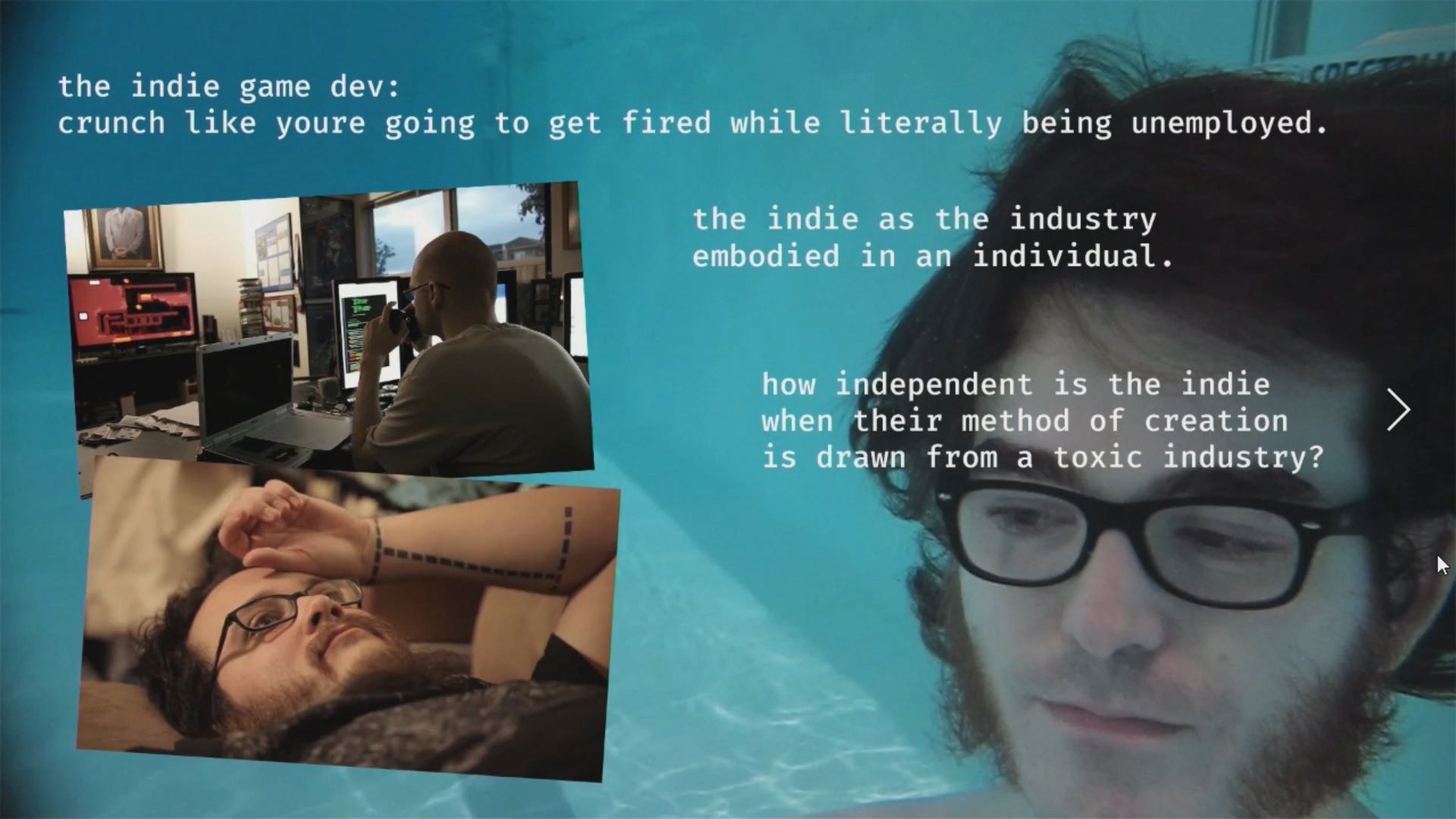
All games are made this way, basically, even a team of two has a structure like this. A team of one has a structure like this. And so, the indie game dev is internalising the industry. They’re crunching like they’re going to get fired, but they literally don’t have a job. They’ve embodied the industry themselves. It’s interesting to think about “how independent are they?”, if their method of creation is drawn from such a toxic industry? The industry model of creation dictates the type of games being created. The industry model equals the vision of the most powerful (through wealth or social capital) dictated to the voiceless worker drones. Before there are interactive systems that make your game, there is the environment in which the work is created. But the internalisation continues…
II - Distribution
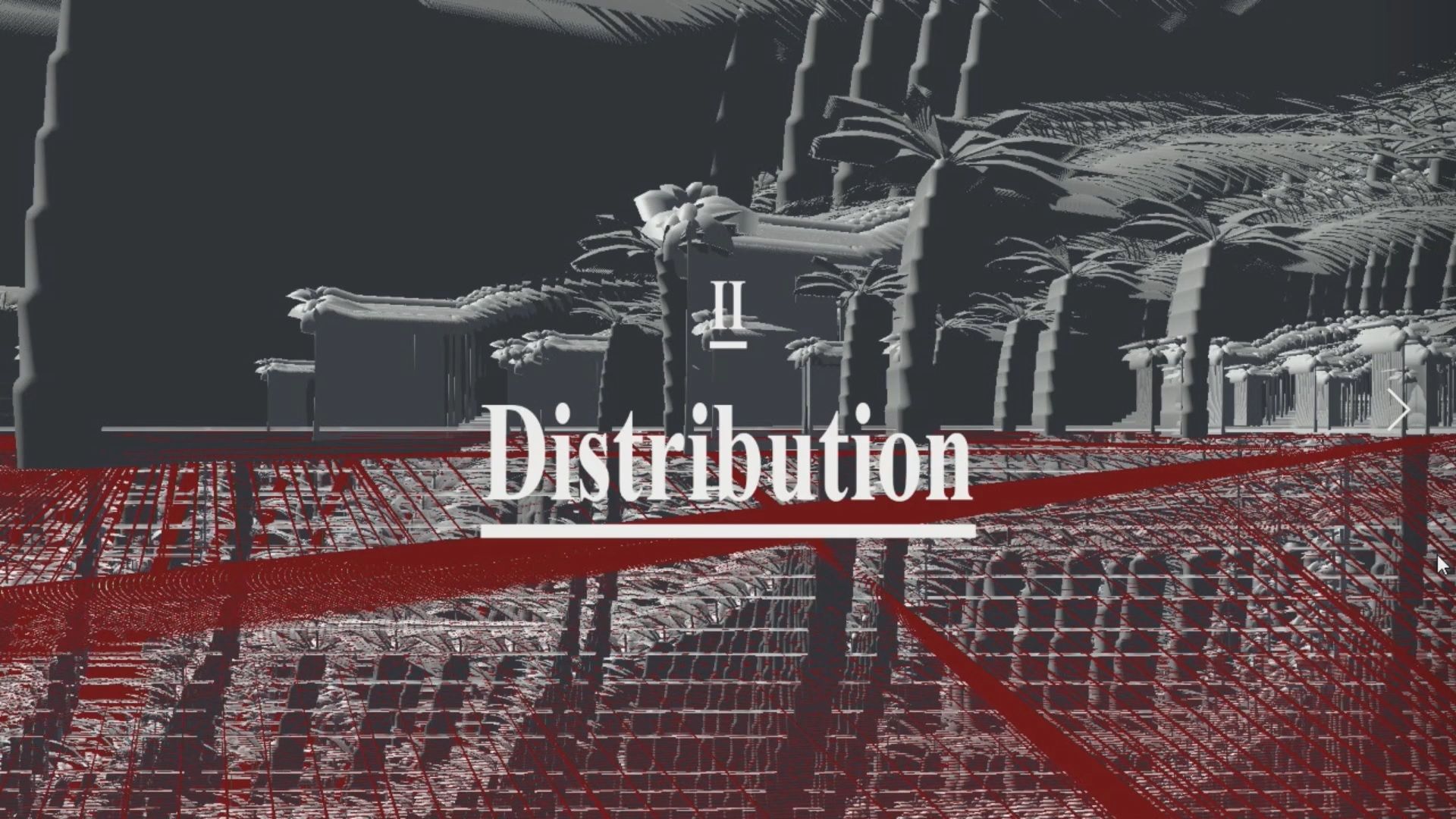
Let’s do a little maths experiment...
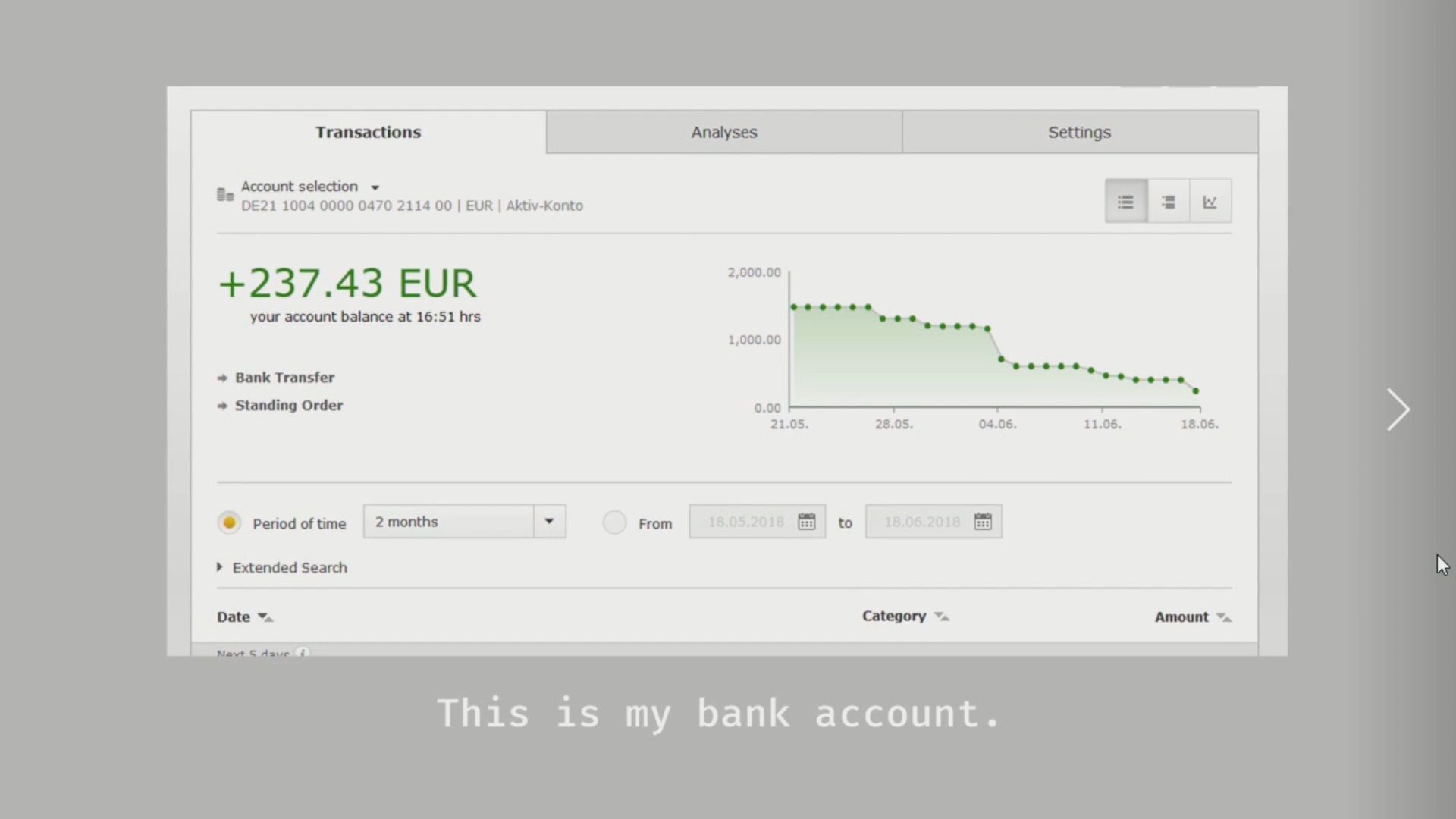
This is my bank account, that's 237€.
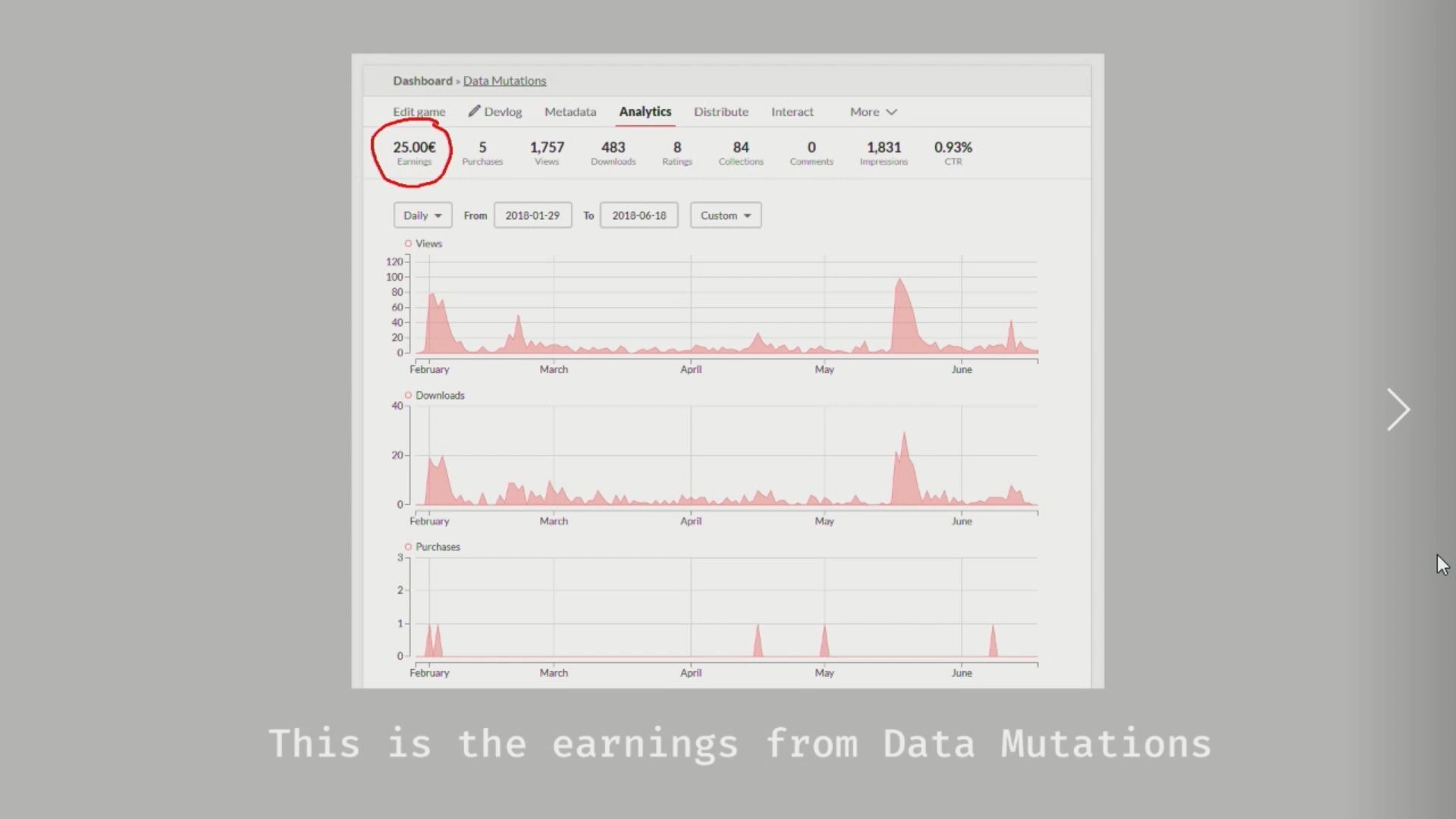
This is the earnings Data Mutation makes: 25€. That’s not much.
12 people worked on Data Mutations.
Thats 25€ divided by 12, that’s 2.083333€.
I’ve been working on Data Mutations in some capacity (assets, my game, trailer, social media, talks, performances, exhibition) for 10 months. Let’s say 3.5 months, full time. 2.083333€ divided by 3.5 equals 0.59€ per month, that’s not much.
But it’s not bad news for everyone...
Esteemed let’s player, Vinesauce, did a let’s play of Data Mutations. It looks like it has 23,877 views, 578 likes, 10 dislikes. It seems like people like it, that’s pretty cool. I’ve checked out a bunch of YouTube money calculators, this isn’t a hard science, obviously, but the numbers are pretty similar across all of them. Vinesauce earns, on average, $732 per video. He’s got approximately $289,149 total from his channel. The Data Mutations video was unedited, so it was effectively made in real time, so it took less than an hour to create, it took 40 minutes.
Vinesauce uploads approximately 90 videos a month. $732 times 90 equals $65,880 per month. I earned 21k last year while making games during weekends, evenings and sick days - so essentially I had to work to work more. Therefore, Vinesauce earns 3 times as much per month as the actual creators of the games he plays do in a year.
But it keeps going, because Youtube uses a revenue split of 45/55 - 45% going to the channel owner and 55% going to YouTube. So if Vinesauce earns $65,880 per month, that means YouTube earns $80,520 per month from Vinesauce. YouTube steals $80,520 from Vinesauce, who exploits hundreds if not thousands of unpaid game developers for nothing. And by the way, we do not get spikes in downloads from these let’s play videos, because they are essentially mocking strange games. No one who watches these videos wants to play these games. So trickle down economics just does not work.
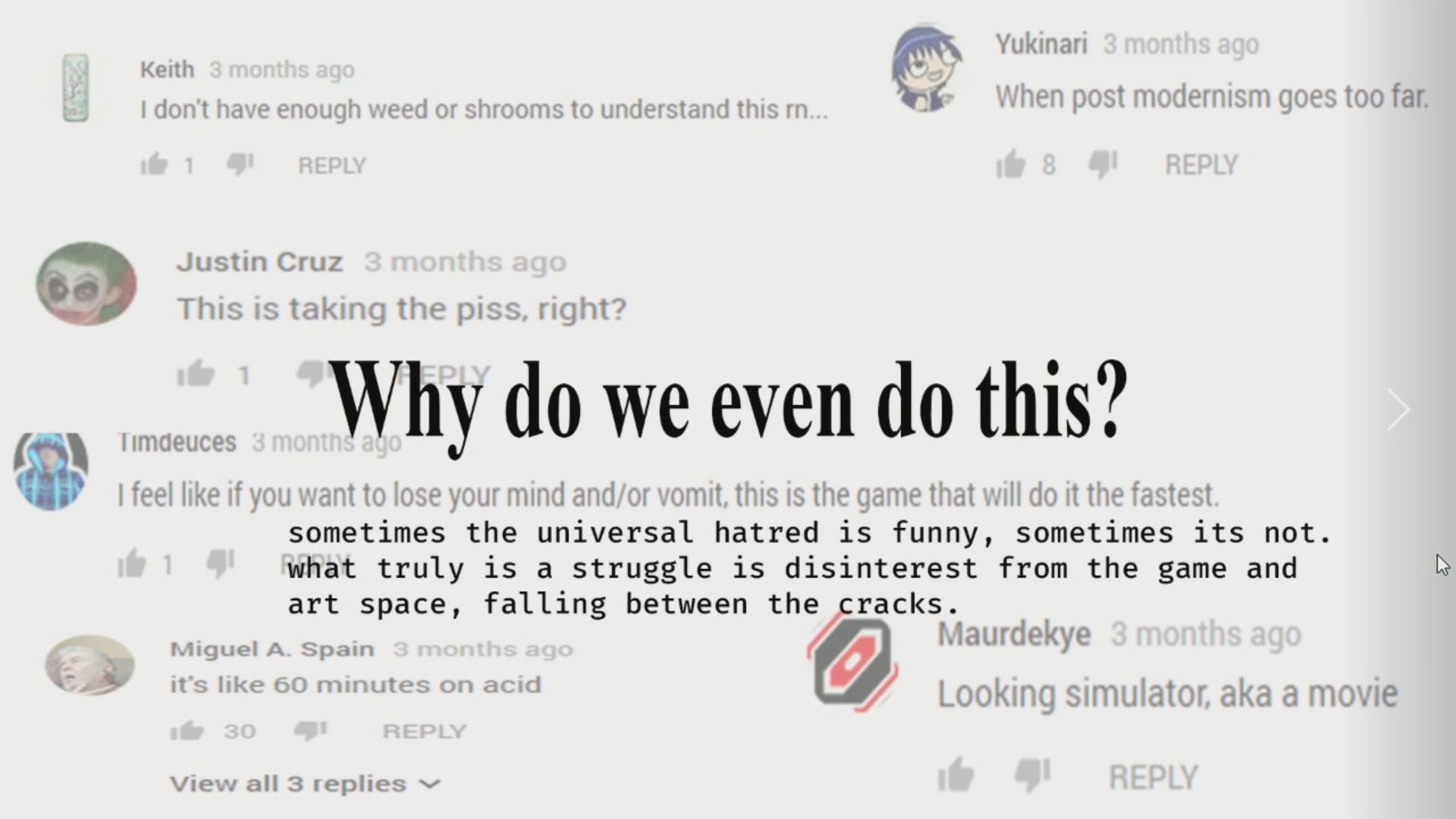
So, this kind of begs the question: Why do we do this, If we’re just going to get insulted by randoms on the internet? Sometimes the hatred is funny, sometimes it’s not if you're feeling particularly vulnerable. And what’s more frustrating is falling between the cracks, between the game space and the art space.
III - Collectively Dreaming New Cultures
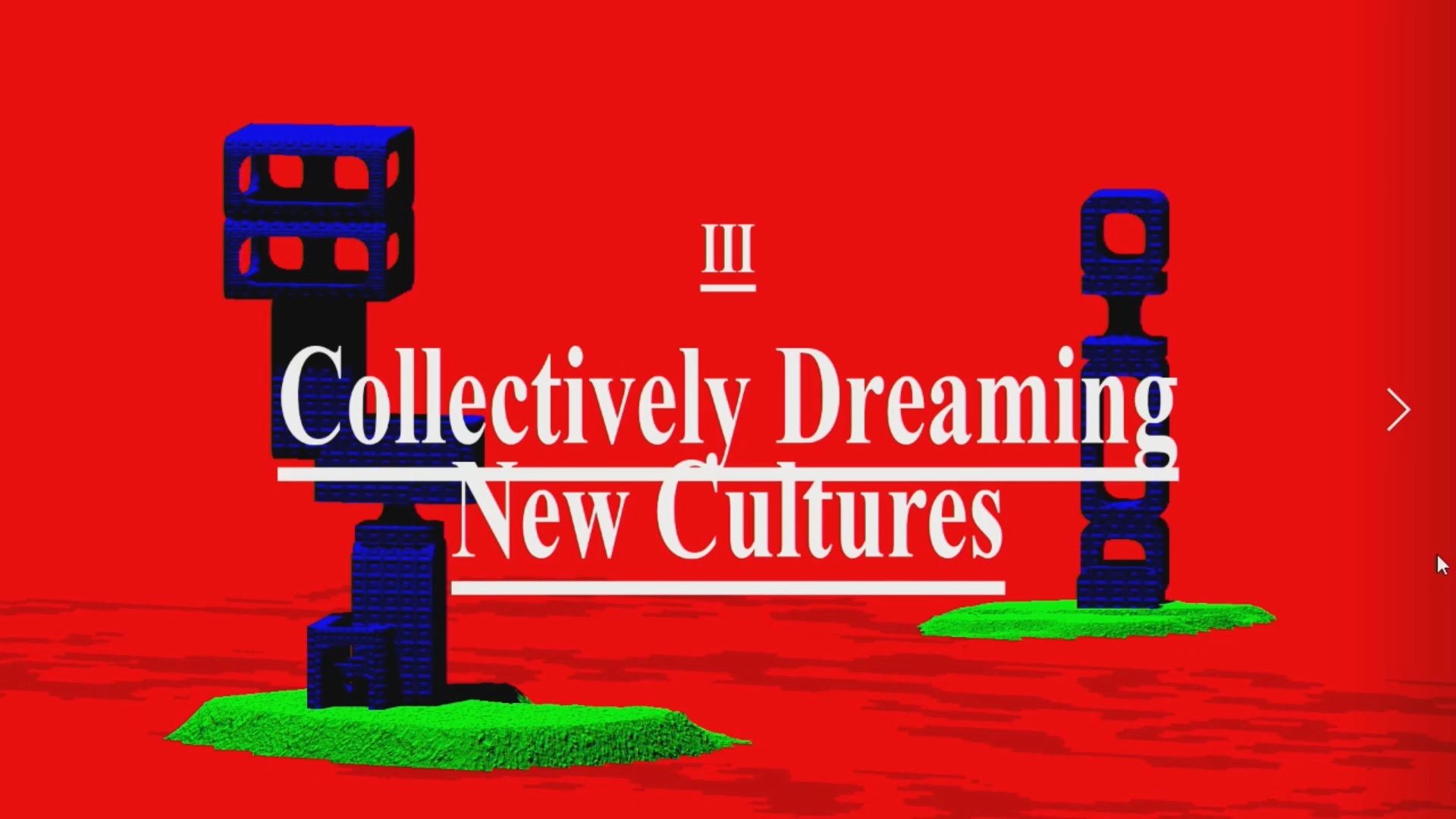
Do we do this for the joy of collaborating with friends and people all over the world?
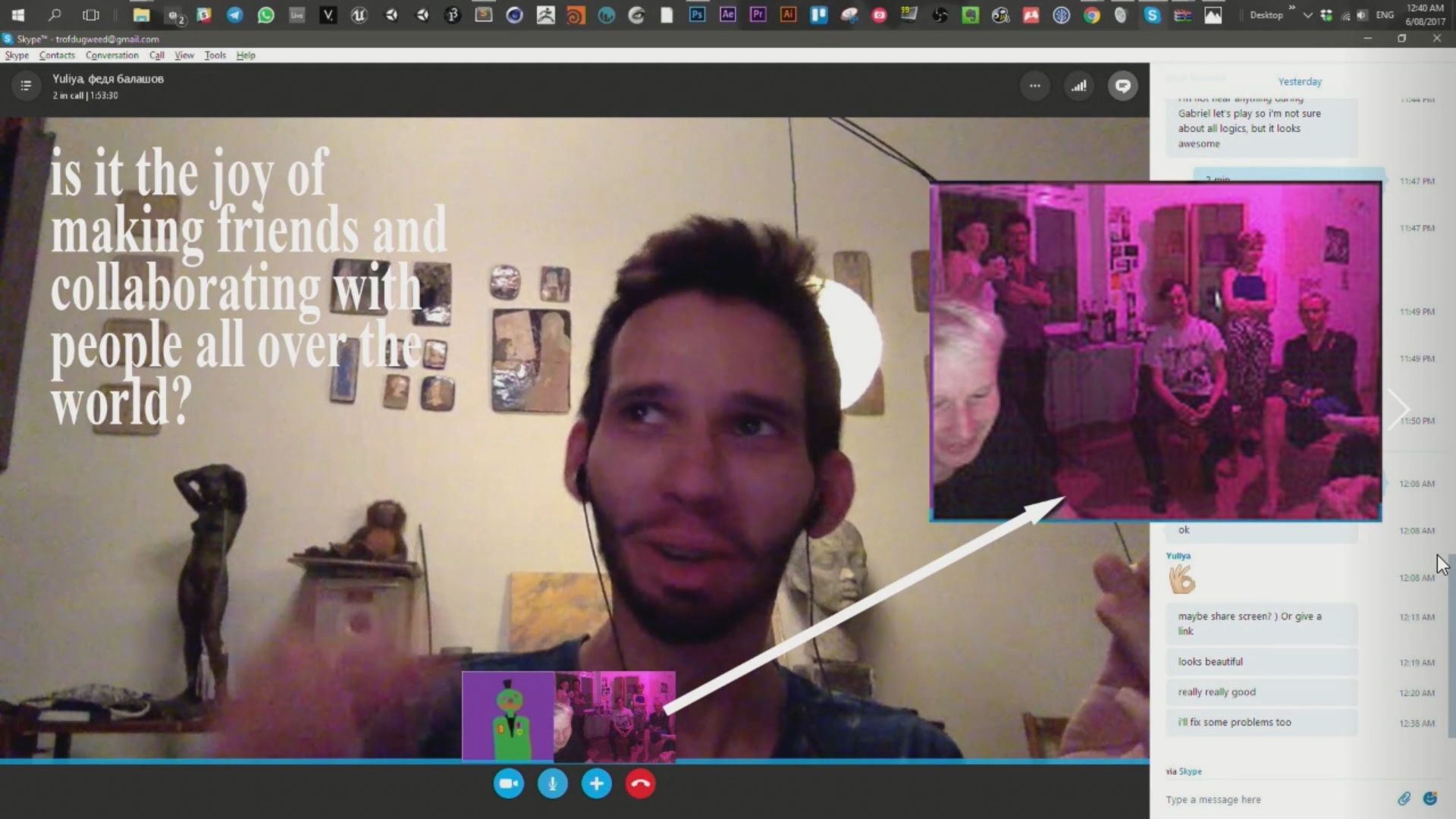
Or do we do it for the thrill of 50 people crowded in one room playing your game - the pride in creating a communal space?
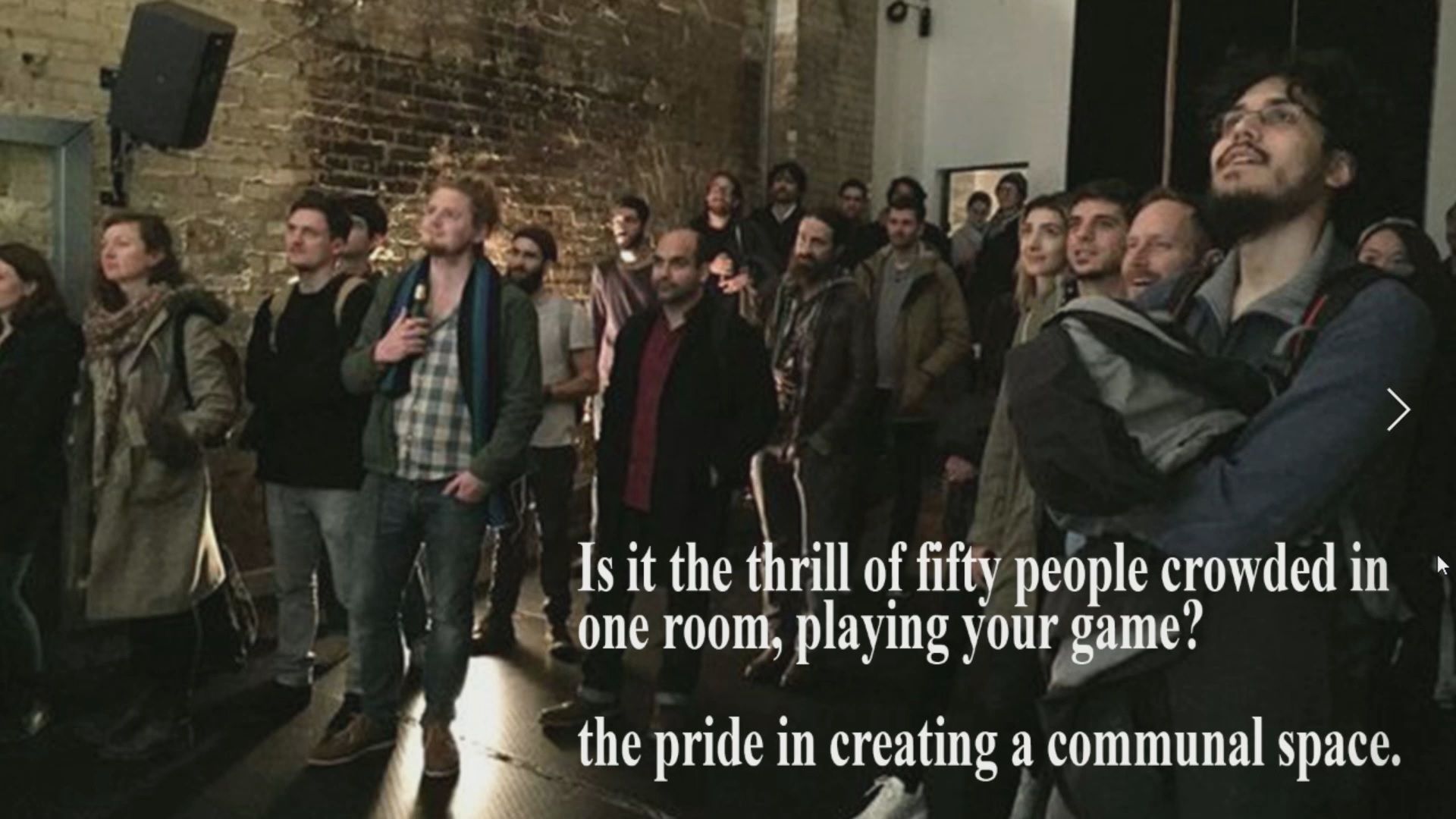
Or is it the continual journey in exploring computer logic artistically - to transform a bureaucratic machine into a poet?
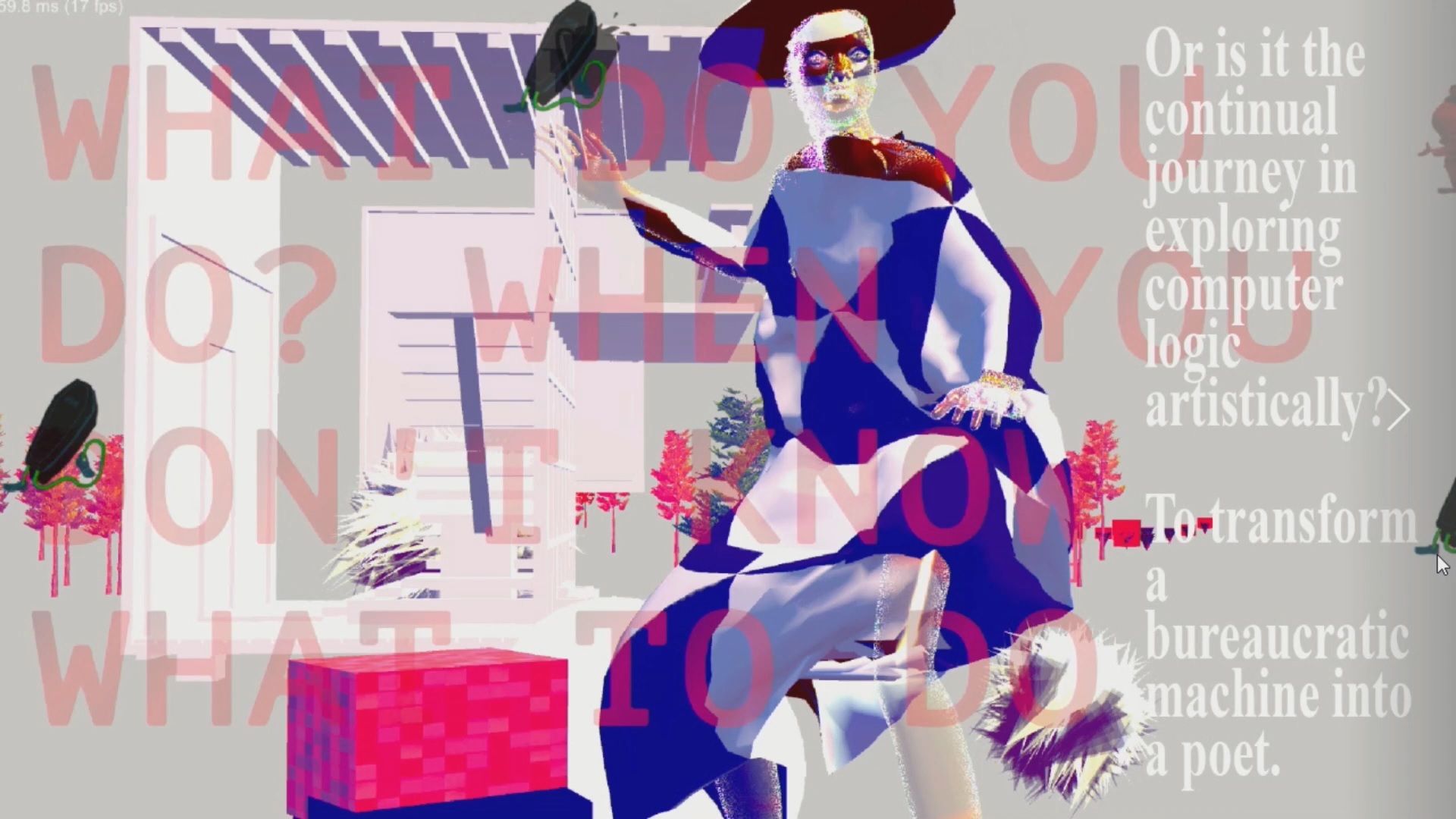
Whatever the reason, simply put: collectively owned work built without infantilizing or stroking the toxic ego of the player is at odds with the populist society we live in. Social media, streaming, and the race to the bottom of the digital marketplace is destroying culture and killing artists. Without a populist demographic, we, as AAA, have no platform, we are invisible within this current ecosystem - and I think that’s good, because that’s not the future I want to live in. Do you? Fuck their platform, burn it to the ground.
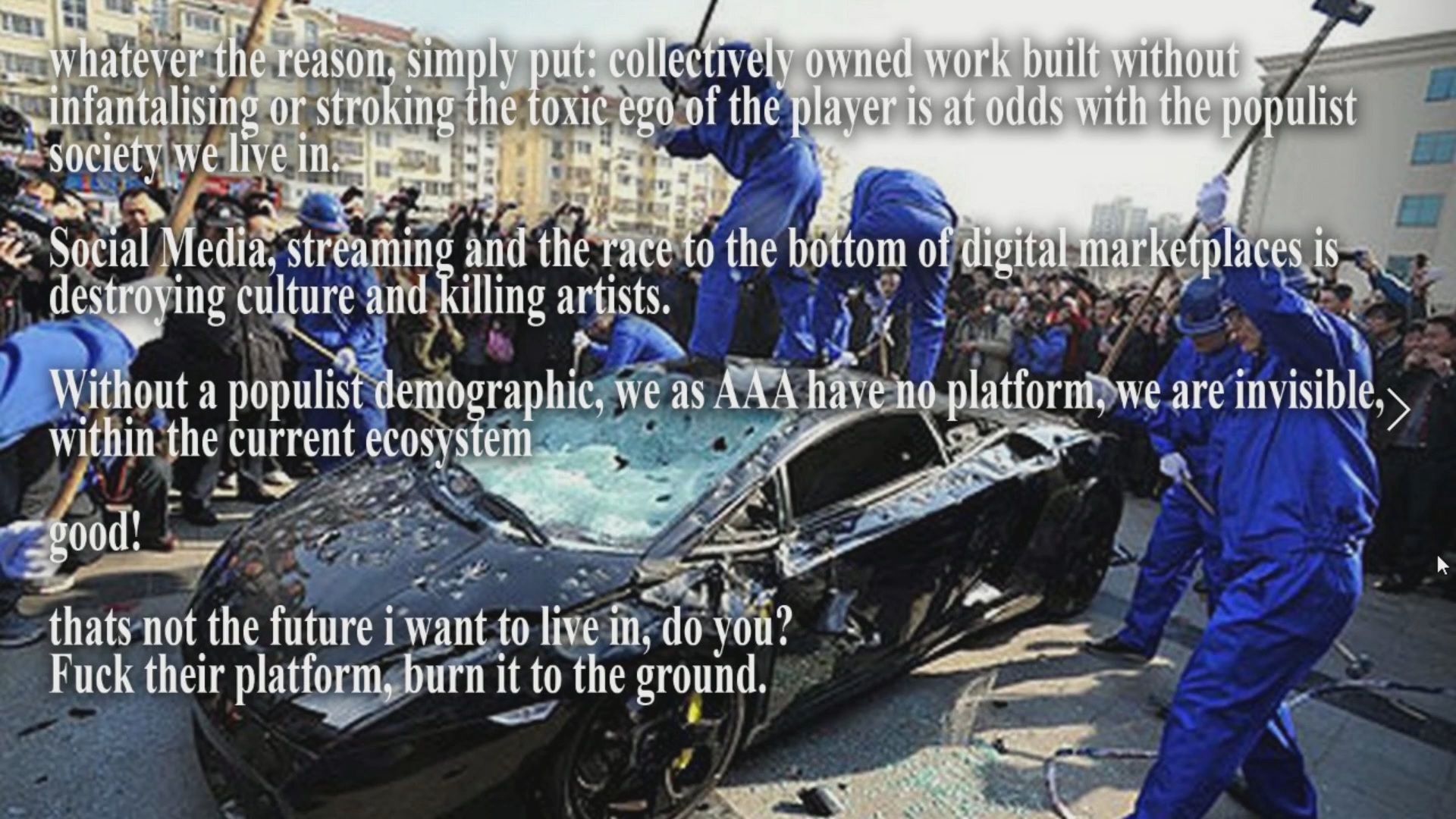
Did you know: culture is created collectively, by people. Together.
Did you also know: You are a person.
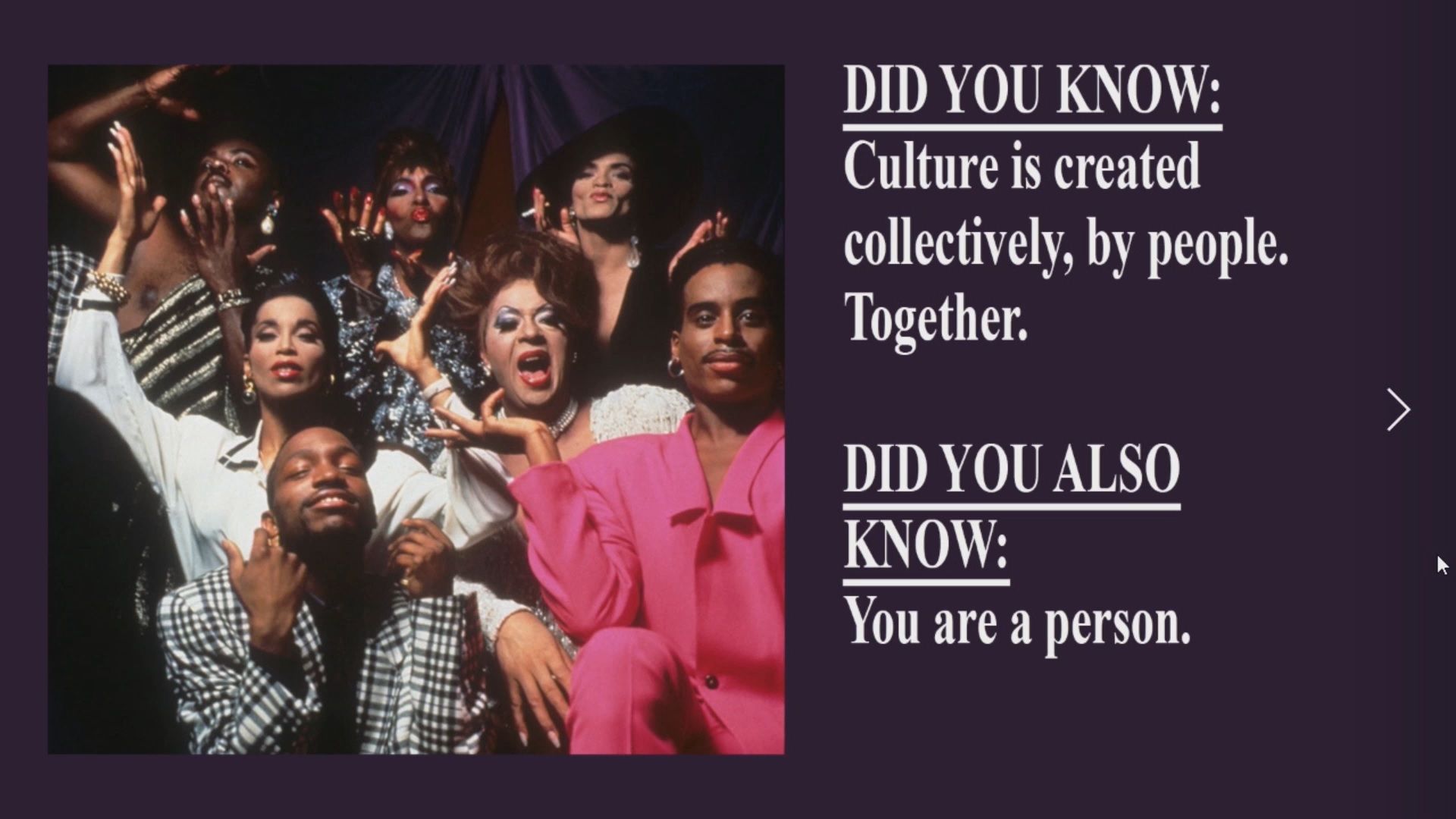
Games are a series of arbitrary choices by the 80’s toy industry that blew up to a massive scale and became cultural canon. Our current understanding and literacy of this ephemeral medium of real time systemic art is so impossibly narrow. Something much greater is possible. I am not sure what it is, but I know we will not find it within the centralised culture we presently find ourselves. It’s time to branch off and discover a new culture together. It’s like if you looked at this animal and thought it was a dog (it’s what I think).
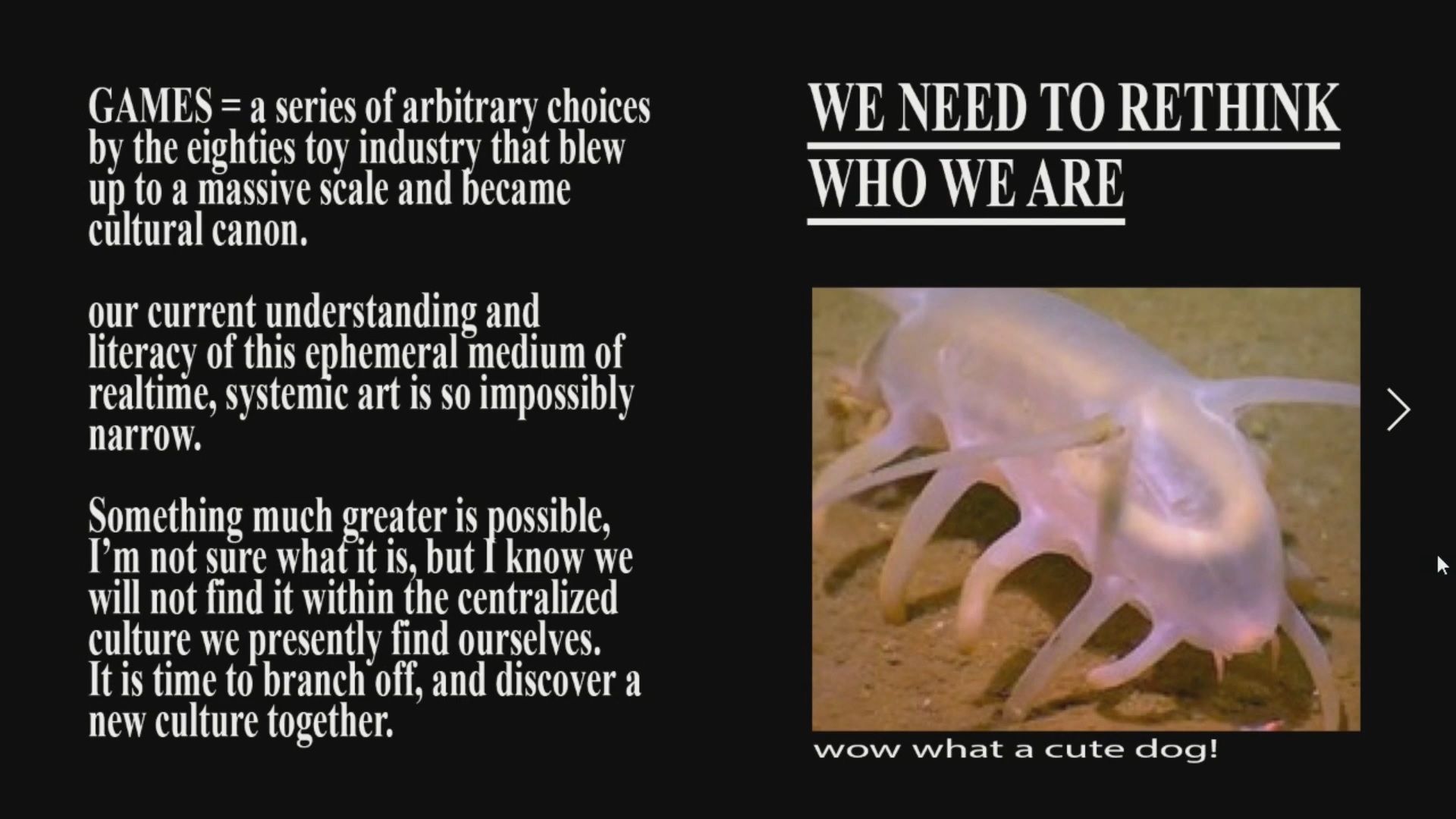
This is The Pyramid of Videogames again. That’s where we have to go, that inverse pyramid, that’s below the ground.
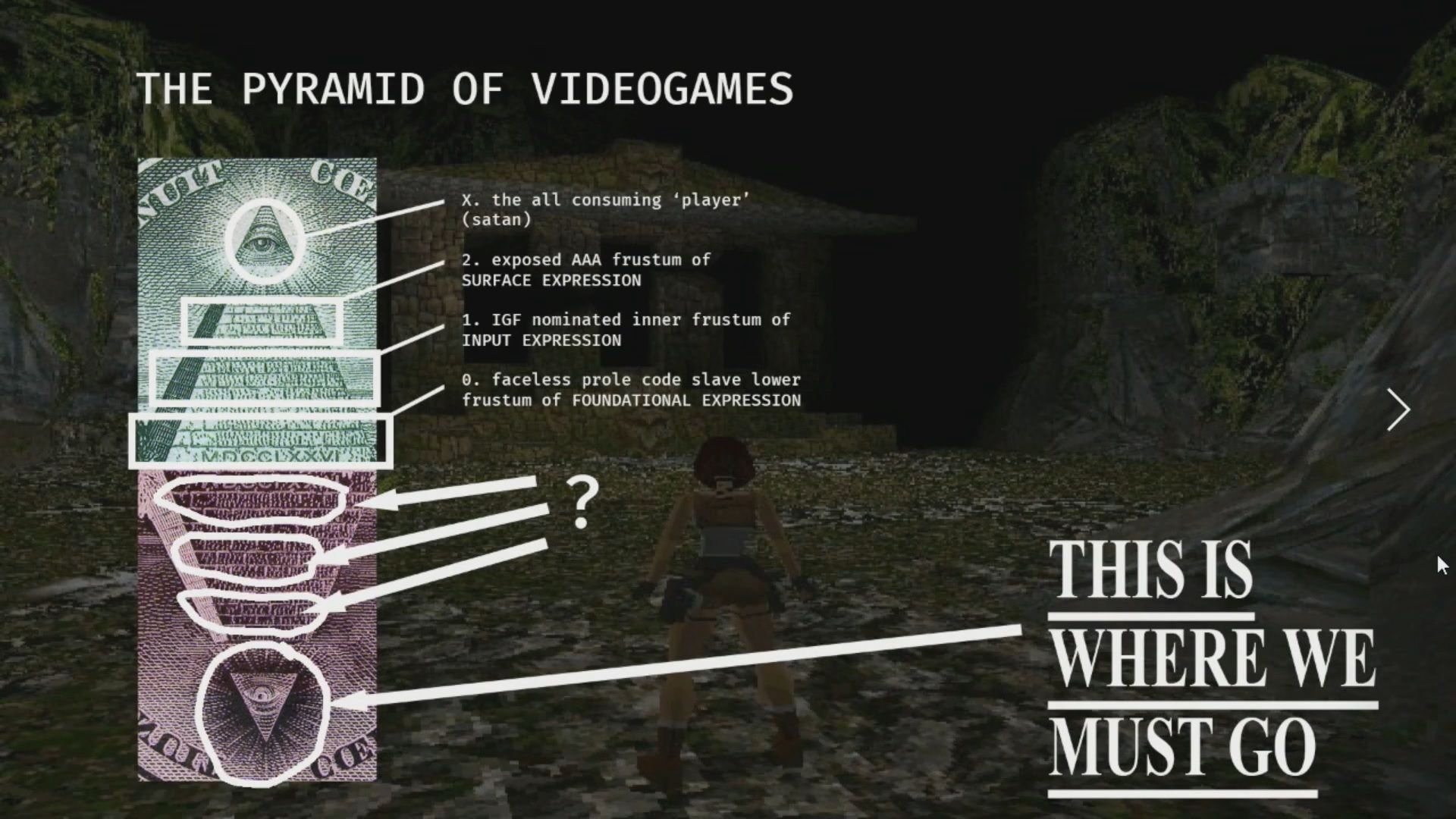
No matter your future direction after study, whether you become an artist or professional game dev, or a butcher, or a baker: I wish you an authentic happy life. The world is your oyster, and the oysters are pretty good in Italy, so thank you for your time.
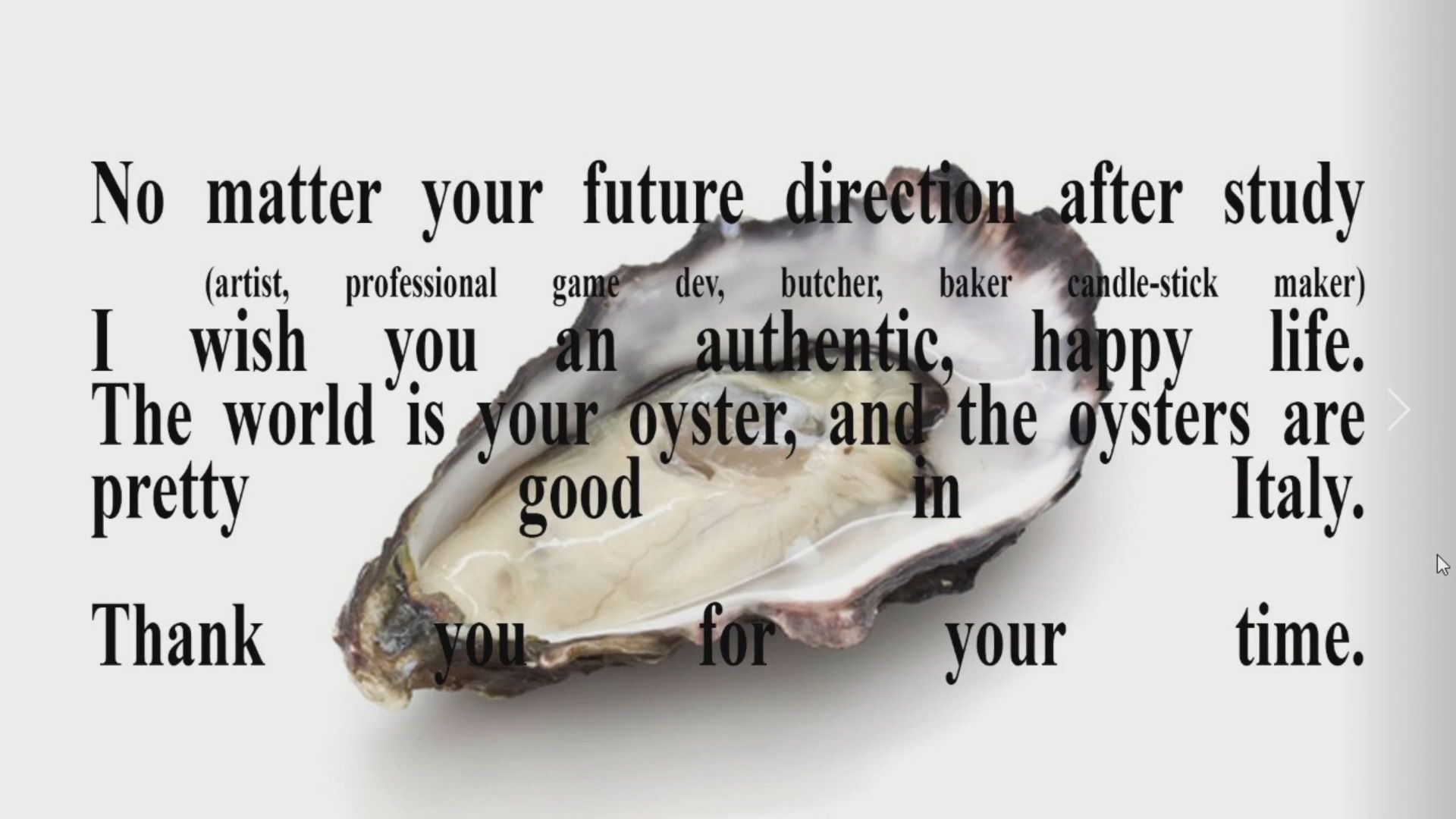
Also, don’t follow me on Twitter. But I’m thinking of starting a mailing list, so if anyone wants just give me your email.
